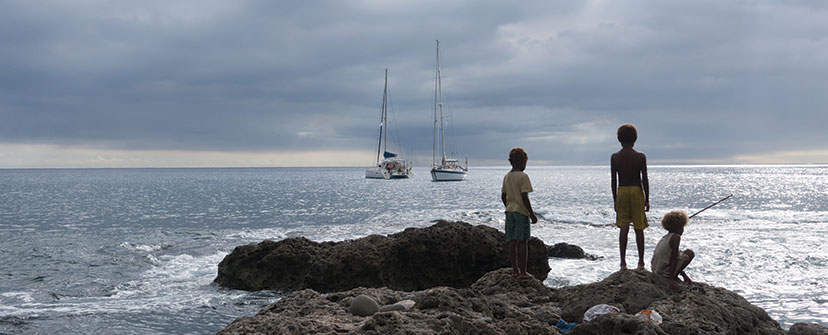The role of businesses in strengthening the rule of law and promoting access to justice in cases of domestic violence in Vanuatu
05 December 2016 | Emily Langford, LexisNexis Capital Monitor
Forty four per cent of women in Vanuatu experienced domestic violence in the past twelve months, 22,901 in total, and in only two per cent of cases did police lay charges.1
The fact that women are denied access to mechanisms of redress and remedies is not reflective of the rule of law espoused as an ideal by western liberal democracies. Principle One of the UN Global Compact's Principles proclaims that "businesses should support and respect the protection of internationally proclaimed human rights."2 Businesses can promote access to justice in three ways: improving access to the law through their core business products and services; investing in justice initiatives in the region through strategic social investment; and advocating for justice reforms in public policy engagement.3
VANUATU
Efforts to improve access to justice are complicated by the ni-Vanuatu dual legal system: state justice and kastom. Women are unable to access the formal justice system and are marginalised in kastom, and are thus vulnerable to human rights abuses.4
The state justice system can be characterised as 'western' justice, consisting of courts, police enforcement, a Constitution and statutes. Kastom is comprised of community justice, dealt by Chiefs, and contained in regional bylaws. The resolution of conflicts is performed by both the state and kastom.5
BARRIERS TO ACCESS TO JUSTICE
Gender equality
A primary barrier to access to justice is gender inequality in a patriarchal system derived from widespread beliefs that undermine women's rights. Women are limited to seeking kastom in cases of domestic violence. Kastom law is inherently gender biased, and often procedurally denies women the power to access justice. Statutes such as the Criminal Procedure Code s118 recommend reconciliation in cases of domestic violence, which discriminates against women.6
A disparity in education levels perpetuates inequality, and prevents women from being aware of their legal rights. In a recent survey of rural ni-Vanuatu women, 60 per cent of women reported no knowledge of the laws of Vanuatu, compared with 27 per cent of men.7
Resources & Services
The Government lacks financial and human resources to effectively administer the justice system. Ninety-three per cent of the Police budget is spent on salaries, with funds unable to cover operational
costs such as fuel necessary to service the entirety of Vanuatu.8 The expenditure of the budget is centralised in Port Vila. The centralisation of formal services poses a significant problem, as 75 per cent of the population live rurally.9 With victims located in the regions and courts located in urban areas, a physical barrier to justice is created.
RECOMMENDATIONS
Businesses are poised to contribute to the development of the rule of law globally. An example of a framework for business participation is the United Nations Global Compact Business 4 Rule of Law. This initiative supports the rule of law through directing services, strategic social investment, and policy engagement to a public issue.10 The framework engages the private sector in protecting human rights and promoting access to justice.Core Business: Collection of Data & Monitoring
Data on kastom relies on anecdotal evidence. The quality of the data in the formal system is limited, as the sector does not follow standardised methods for recording information, and there is no central case management system. Primary data from the Courts is neither gender nor age disaggregated, preventing an understanding of the demographics.11
Vanuatu must commit to further data collection to effectively address the barriers to access to justice by women, as the demographic of those in need must be known. The lack of demographic information adversely affects the courts' ability to respond to the needs of victims. The availability of statistical information is integral to the justice sector so that they can effectively design and implement non-discriminatory services.
LexisNexis® is advancing the rule of law in the Asia-Pacific through the provision of services to Pacific governments as part of its core business. An example of this is their work for the Vanuatu Ministry of Justice to migrate court documents to a standardised system of an international standard. Lexis Visualfiles™ for Vanuatu implemented a Court Management system to support access to justice. The service facilitated data migration and will continuously improve the collection of data and the utilisation of resources such as staff. The compilation and publication of these documents will facilitate the monitoring and regulation of the judiciary. Access to justice is supported by high quality, accountable legal systems, which are maintained through monitoring.13
LexisNexis is also pioneering the consolidation of the laws of certain Pacific countries as part of its core business, for example, for Fiji.14 Through revising and publishing regional statutes and law reports, LexisNexis is enabling the proper functioning of the legal and judicial system by providing access to law and improving the efficacy of the administration. The reports are to be published online and in print bilingually, creating a legal reference framework. The creation of these databases permits for the monitoring of the legal system to identify inherent flaws and thus to improve access to justice.Strategic Social Investment and Advocacy: Advancing Gender Equality
To ensure justiciability, women must be empowered to claim their rights. Education is the primary means for shifting social views. Gender parity at a primary level is equal, however, at a tertiary level, women have little access to educational opportunities.15 The Government must educate its future leaders, and create public awareness, explaining what constitutes a crime, individuals' rights and the means of redress.16 Businesses must prioritise investment in the education of women and furthermore direct their advocacy and policy engagement towards advancing gender equality.Strategic Social Investment: Funding
It must be acknowledged that any recommendations made to improve access to justice in Vanuatu are based on levels of funding which Vanuatu does not have. Vanuatu has no income tax and generates a small national revenue.
Financial support must be targeted at supporting victims of domestic violence.17 Investment should be prioritised to the Vanuatu Women's Centre. The Australian Government currently funds 100 per cent of its budget. Moreover the Government funds 36 per cent of the operational budget of the Police, which includes the Family Protection Unit that provides direct support to victims.18 Businesses must invest funds and services in the region to assist government and non-government actors in the development of the rule of law.
CONCLUSION
Businesses have the technical capacity, funds and professional expertise to ensure that Vanuatu improves the quality and accountability of their legal system. They should continue to pursue responsible engagements such as these, which raise the corporate social responsibility profile of the business and assist in the development of good governance and stability in the region.
 LexisNexis
LexisNexis

